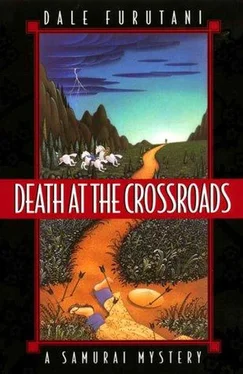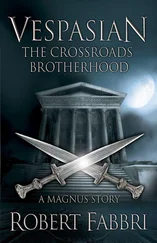Dale Furutani - Death at the Crossroads
Здесь есть возможность читать онлайн «Dale Furutani - Death at the Crossroads» весь текст электронной книги совершенно бесплатно (целиком полную версию без сокращений). В некоторых случаях можно слушать аудио, скачать через торрент в формате fb2 и присутствует краткое содержание. Год выпуска: 2011, ISBN: 2011, Жанр: Исторический детектив, на английском языке. Описание произведения, (предисловие) а так же отзывы посетителей доступны на портале библиотеки ЛибКат.
- Название:Death at the Crossroads
- Автор:
- Жанр:
- Год:2011
- ISBN:068815817X
- Рейтинг книги:3 / 5. Голосов: 1
-
Избранное:Добавить в избранное
- Отзывы:
-
Ваша оценка:
- 60
- 1
- 2
- 3
- 4
- 5
Death at the Crossroads: краткое содержание, описание и аннотация
Предлагаем к чтению аннотацию, описание, краткое содержание или предисловие (зависит от того, что написал сам автор книги «Death at the Crossroads»). Если вы не нашли необходимую информацию о книге — напишите в комментариях, мы постараемся отыскать её.
Death at the Crossroads — читать онлайн бесплатно полную книгу (весь текст) целиком
Ниже представлен текст книги, разбитый по страницам. Система сохранения места последней прочитанной страницы, позволяет с удобством читать онлайн бесплатно книгу «Death at the Crossroads», без необходимости каждый раз заново искать на чём Вы остановились. Поставьте закладку, и сможете в любой момент перейти на страницу, на которой закончили чтение.
Интервал:
Закладка:
Lord Manase raised his closed fan to his lips, a sure sign he was losing patience with Nagato’s silence. “Perhaps there’s another explanation, Manase-sama,” Nagato blurted out.
“Sooooo?” This time Nagato could tell the intonation of the single word indicated interest.
“Yes, yes. Perhaps that ronin killed him.”
Manase gave a high, tittering laugh. “Whyyyy wooould you think that?”
Nagato knew he wasn’t clever, but he was certainly cunning. “I noticed many things about the body that indicated it wasn’t killed at the crossroads.”
“Sooooo?” Now more interest.
“Yes, yes, Lord. The merchant had only one sandal. The other sandal was not at the crossroads, which meant it was lost where the merchant was really killed.”
“Aaannd you observed that?”
Nagato squirmed a bit. Manase might ask that fool of a village headsman, Ichiro, so he didn’t want to lie directly. “I got that information by questioning the ronin.”
Lord Manase started absently tapping his closed fan into the palm of his hand, a sure sign he was thinking.
“Interesting,” Lord Manase said.
“And there’s more, Manase-sama.”
“So?”
“I am almost certain it wasn’t Boss Kuemon who killed this merchant.”
“ Honto? Truthfully?”
“Yes, Lord.”
“How do you know this?”
Nagato almost smiled. He had gotten the Lord to communicate with him in full sentences, instead of the single words and subtle movements of a fan or eyebrow that the Lord normally used. “Because,” Nagato said, “when I examined the dead merchant, he still had money in his pouch. Even if for some reason Boss Kuemon would move a body to get rid of it, he would never allow it to be dumped with money.”
Nagato felt the Lord look at him with new respect.
“That’s a very interesting point, Nagato,” Lord Manase said. It was one of the few times he used Nagato’s name, and the Magistrate sat up straighter. “But why do you think the ronin killed the merchant?”
“He just knows too much about it,” Nagato said flatly. “He said the merchant wasn’t killed at the crossroads, and he said he knew even more about the murder, but he wouldn’t tell me what it was. The only way he could know so much was if he did it himself.”
Once again the tapping of the fan in the open palm of the other hand. Finally, Lord Manase said, “But I thought the charcoal seller said he saw the ronin coming down the road from Uzen after he found the body.”
Now Nagato played his trump card, one that had occurred to him only moments before. “The charcoal seller and the ronin did it together. Yes, yes. Maybe he was paid, but for some reason that peasant is lying about how he found the body and the time when the ronin appeared.”
“That’s a very interesting idea. Frankly, Nagato, I’m surprised you were able to think of it.” Nagato didn’t hear the rebuke, instead he only heard the surprise and pleasure in Lord Manase’s voice. Nagato gave a solemn bow of thanks to his master.
“Sooo … are you going to arrest him?” Lord Manase said, putting his fan up to his mouth to indicate his boredom with these mundane details of administration.
Nagato started licking his lips. He gave another bow, this time one of apology. “That might be very difficult to do,” he said. “The samurai seems very strong, and with my men … that is, it seems … ahh …”
Lord Manase looked at Nagato as if he were an especially interesting variety of cricket. “In other words, you’re afraid to arrest him.”
Nagato bobbed down again. “It’s not a matter of … well …” He bowed yet another time.
“All right,” Lord Manase said. “I’ll think about this when I find the time. After all, what’s the death of another merchant? This conversation has gotten very tedious.” Manase flicked his closed fan as if he were knocking away a flea. “Leave now. When I think of something, I’ll tell you.”
Nagato gave a final bow and left the chamber of the District Lord. As soon as he was out of the room, he gave a sigh of relief. The Lord had not asked too many questions, and he had not been ordered to capture the samurai. Nagato’s objectives for the interview had been met. He swaggered down the path from the Lord’s manor to the village.
It was a fifteen-minute walk from the Lord’s manor to the village. As he made his way on the path, Nagato congratulated himself for outsmarting the weird Lord. All too often, the Lord had made it clear that he considered Nagato a fool, openly laughing at some of Nagato’s responses to the cryptic questions he asked. The snot.
The Lord affected the old-time courtly speech of nobles, but Nagato knew that the Lord’s family was no more noble than his own. They were both samurai, and although Nagato had let his own martial skills decline over the years, he was still convinced that he could best the effete Lord in a duel, if only the iron-clad bindings of duty would allow such a thing. Instead, because of an accident of battle that everyone in the village knew, the small, pasty-faced man sitting in the darkened room was absolute master of the District, and Nagato was Magistrate, sworn to serve him until death. Nagato summoned up a viscous ball of phlegm from deep within his throat and spat it out on the side of the path.
The unfairness of the situation was something that Nagato ruminated on often, especially when he was in his cups and feeling unhappy with his circumstances in life. It was a dangerous feeling to have, but it was a dangerous time. If the Taiko had risen from peasant to ruler of Japan, why couldn’t a samurai like Nagato Takamasu dream of ruling one miserable, 150- koku district like this one? (A koku was the amount of rice it took to keep one warrior fed for a year.) This was a common fantasy for the Magistrate, and it was a measure of his limited horizons that his fantasies never extended to ruling more than the tiny mountain district. Unfortunately, despite his fearsome attitude toward the farmers and peasants of the village, Nagato was not even the ruler of his own household.
Nagato’s mother-in-law had reached the age of sixty-one, the traditional age when a Japanese could say and do what he or she pleased. Of course, she had never inhibited herself too much from doing that anyway, at least in the confines of the Nagato house. But she was increasingly more blatant about her disappointment over the adoption of Nagato.
The Magistrate was not born a son of the Nagato household, and the old woman would lament that her now-deceased husband had made a terrible mistake in his haste to perpetuate the Nagato line. The Magistrate also thought a mistake was made, but for very different reasons.
The Magistrate was the firstborn son of Hotta Masahiro. By tradition, the firstborn son should inherit the rights and lands of his father, but the fact that the Magistrate had been offered for adoption meant that he was actually the product of a love affair that occurred before his mother married Hotta. Otherwise, a firstborn son would never be adopted out. Undoubtedly, this love affair had been with someone other than Hotta, although the Magistrate was never able to ascertain who his real father was.
An unexpected pregnancy would also explain why his mother, who was of a higher social status than Hotta, would marry beneath her. It was hard to arrange marriages on short notice with families of equal social status. Such marriages were complicated affairs done to solidify position or, by using the marriage to cement a military alliance, security. They took considerable time, and with a pregnant daughter growing larger by the day, a family did not have as much time as a normal marriage would require. It could arrange a marriage that was a step down the social ladder much faster than a union of peers. The groom who accepted such a bride ended up with a mate that enhanced his social status, even though the pregnancy was obviously an embarrassing inconvenience that would have to be ignored.
Читать дальшеИнтервал:
Закладка:
Похожие книги на «Death at the Crossroads»
Представляем Вашему вниманию похожие книги на «Death at the Crossroads» списком для выбора. Мы отобрали схожую по названию и смыслу литературу в надежде предоставить читателям больше вариантов отыскать новые, интересные, ещё непрочитанные произведения.
Обсуждение, отзывы о книге «Death at the Crossroads» и просто собственные мнения читателей. Оставьте ваши комментарии, напишите, что Вы думаете о произведении, его смысле или главных героях. Укажите что конкретно понравилось, а что нет, и почему Вы так считаете.












